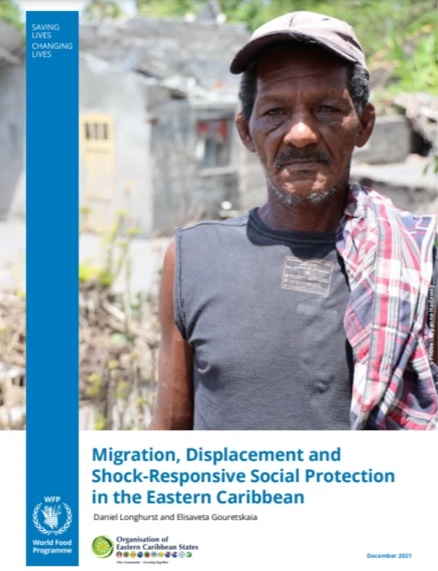Social protection support to migrants in times of crisis – An OECS Case

By Alisha Ally Communications Specialist, Organisation of Eastern Caribbean States & Carla Alleyne Communications Officer, World Food Programme
Wednesday, February 23, 2022 — The Caribbean has a strong history of intra-regional movement for work, trade, leisure, and following the impact of a crisis, particularly in the Organisation of Eastern Caribbean States (OECS) region. The displacement of 20% of the population of the island of Saint Vincent from their homes as a result of the La Soufrière eruption is a stark reminder of the disruption disasters can have on the lives of people in affected countries. Many affected Vincentians chose to remain on the island, but neighbouring islands were open to receive persons who had been displaced. Other countries experienced similar challenges, such as Dominica, where the devastation caused by Category 5 Hurricane Maria in 2017left some people with no choice but to flee the country in search of food, shelter, and work.
While citizens in the OECS enjoy free movement within the sub-region, in times of crisis, when people have lost everything, receiving assistance in another country through national social protection systems remains a challenge. In many countries, foreigners face restrictions limiting access to social protection schemes and benefits on the same basis as nationals. The OECS Commission continues to provide ongoing training towards enhancing the capacity of border officials to receive displaced persons. In 2020 and 2021, border officials in the OECS Member States received training on managing cross-border movement during disasters. Further, the OECS Commission has partnered with the United Nations Children’s Fund (UNICEF) to produce a Tool kit on Social Protection Response in times of emergencies.
With the frequency and intensity of climate-related shocks expected to worsen in the Caribbean, climate and disaster-related migration and displacement are becoming increasing concerns for policy-makers, raising questions about how to address critical needs of non-nationals in times of crisis. The Organisation of Eastern Caribbean States (OECS) and the United Nations World Food Progamme have collaborated to produce a report on the use of social protection in response to shocks in the Eastern Caribbean with a focus on migration and displacement.
The new report provides an analysis of the regional social protection policy framework in the context of migration and displacement and identifies key challenges and gaps for non-nationals in accessing social support programmes in the context of emergencies. Building on this analysis, the report identifies opportunities and offers recommendations for national and regional policy-makers to strengthen migrants’ access to social protection. It also considers strategies for managing the risks migrants confront when faced with natural hazards and economic shocks in a foreign country. The recommendations build on the lessons learned from national responses within the OECS to hurricanes and the COVID-19 pandemic and stress the importance of strengthening policies and institutions, data and information management, programmes and delivery systems, and financing.
Among the report’s key recommendations is the development of standardised registration tools for people displaced by shocks when they arrive in another country and for referral to services including social protection. Other actions put forward include the implementation of sensitization campaigns for migrants and vulnerable groups focusing on legal protection and rights, education, and medical care. At the regional level, the report highlights the need for policies that support remittances from the diaspora with reduced costs for transfers along with exploring options to support social protection for migrants through international funding agencies.
The report was produced with support from the United Nations’ Joint SDG Fund. The programme aims to reduce poverty and inequality and strengthen people’s resilience through adaptive and universal social protection.
An online version of the report titled ‘Migration, Displacement and Shock-Responsive Social Protection in the Eastern Caribbean’ can be downloaded here.
Note:
The United Nations World Food Programme is the 2020 Nobel Peace Prize Laureate. WFP is the world’s largest humanitarian organization, saving lives in emergencies and using food assistance to build a pathway to peace, stability and prosperity for people recovering from conflict, disasters and the impact of climate change.





